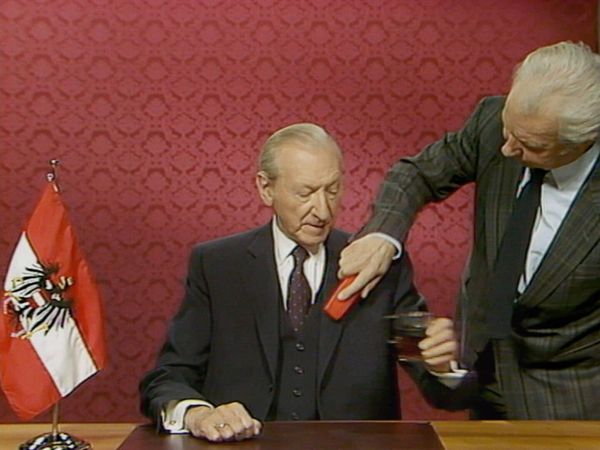 |
| The Waldheim Waltz director Ruth Beckermann on getting the footage of Kurt Waldheim before he delivers his presidential acceptance speech: "This was really a lucky moment." |
In the final instalment of my conversation with Ruth Beckermann on The Waldheim Waltz, Austria's Oscar submission for the 91st Academy Awards, we discussed her filmmaking style (for The Dreamed Ones on the letters of Paul Celan and Ingeborg Bachmann; Those Who Go Those Who Stay on chance encounters; Paper Bridge on Beckermann's family; Return To Vienna with Josef Aichholzer; East Of War), the Waldheim family, the historians, and the archival footage that included a "lucky moment" finding Kurt Waldheim preparing, minutes before he delivered his televised presidential acceptance speech.
We met at the Hudson, the former American Woman's Association clubhouse, that was turned into a hotel. It was renovated by designer Philippe Starck and Ian Schrager, co-owner of Studio 54, who is featured in Matt Tyrnauer's documentary.
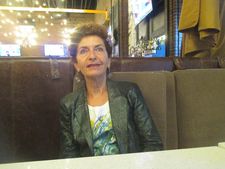 |
| Ruth Beckermann: "I want people to see that I film, to see me and my crew, and to react to the camera." Photo: Anne-Katrin Titze |
Anne-Katrin Titze: The clips you show from the Waldheims in New York are fascinating.
Ruth Beckermann: At the UN and the house.
AKT: Yes. His wife [Elisabeth Waldheim] is the tour guide, playing Jackie Kennedy, Austrian style, showing their house. It gives interesting insight into this family. Did you know from the start that you wanted footage like this to go with your own from '86?
RB: You know, you want many things and you go into archives and you are happy if you find something like this. I didn't expect this or to find the scenes with the son [Gerhard]. But I think the family is interesting because they are so aloof.
They feel like untouchable, both of them. And he's very much annoyed that anybody dares to criticise him. He didn't expect that. He was always on top. For a long time nobody dared to open their mouth against him.
AKT: In the footage you got, I admired your courage to go right into things. You are so much in the middle.
RB: Me? That's my way of filmmaking since.
AKT: The hands! Waldheim's hands you get and they are gigantic.
RB: After watching this footage after so many years, I thought, my filmmaking hasn't changed that much. I want people to see that I film, to see me and my crew and to react to the camera.
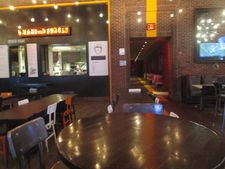 |
| At the Hudson before Ruth Beckermann arrives for our conversation. Photo: Anne-Katrin Titze |
AKT: Another fascinating bit of archival footage you show are the moments right before Waldheim gives his acceptance speech on television, which clearly were never seen before.
RB: The last scene of the film?
AKT: Yes, we see him tucking in his shirt, getting ready.
RB: Yes, and the cleaning lady! You cannot invent that!
AKT: How did you find the footage?
RB: This was really a lucky moment. TV, at least Austrian TV, most of the archives keep only what they transmitted. We in Vienna have a place called Medienwerkstadt, which is a place where they collect video footage and stuff. One day this friend who works there called me and said "You work on a film about Waldheim, do you?" I said "Yes". So he said "I just saw him on a cassette."
A journalist who died in the meantime, he gave them his material. And this journalist was present when they shot this speech with Waldheim. But he didn't give the cassette back to the Austrian TV. So he kept it at home for whatever reason.
AKT: For the reason that now you could include it in your documentary.
RB: Of course it was amazing. Of course I cut the speech.
AKT: He, Waldheim had been asked early on "Have you ever been to Yugoslavia?" And he said "No." These blatant lies! Many people seeing this will make connections. Were lies part of your structuring the film and what you were looking for in the archives?
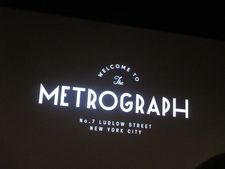 |
| The Waldheim Waltz opens at The Metrograph in New York on October 19 Photo: Anne-Katrin Titze |
RB: Yes, I focused on a politician who is lying and on the other hand on these mechanisms of populism, right-wing populism creating a hostile other. Using their prejudices that exist in the population, that's what happens again today. If it's not anti-Semitism, it's racism. It's always the same.
AKT: Austria today and in '86 - where do you see the main parallels and differences?
RB: Society is very different, much less homogeneous. There are so many people with migration background. But as I said, the mechanisms of the right-wing parties, how they win elections are the same. And they were successful again.
AKT: Scary times we are living in.
RB: Unfortunately not only in Austria. At the time everybody protested Austria and today you have these movements in so many countries. In Italy they are in power, which is a more important country than Austria.
AKT: The most shocking slogan for Waldheim in your documentary for me was "Jetzt erst recht" It's chilling, the audacity to state "Now more than ever!"
RB: On yellow paper! It's also like a child.
AKT: Defiant.
RB: I had a discussion - they invited the campaign chief of Waldheim last week to a cinema in Vienna. And he was asked why this yellow paper and these slogans. And he said "You know, we wanted to have it on pink paper. And the printer called us and said they didn't have the pink paper and so it became yellow." I mean, this is again a lie in my opinion. Who would use pink for a campaign? If you are LGBT you might.
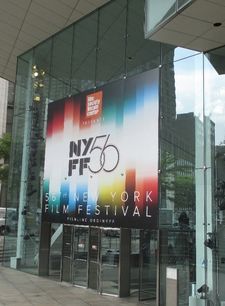 |
| The Waldheim Waltz had its New York première at the 56th New York Film Festival Photo: Anne-Katrin Titze |
AKT: But not for Waldheim.
RB: Not for politics in this traditional sense. A lie again! But you cannot prove it.
AKT: The actual war crimes, there was never any real follow-up for Waldheim after he was elected?
RB: No, there was this commission of historians who wrote a report of 250 pages two years later. But they couldn't prove anything. They couldn't prove that he was present at a war crime or a massacre or whatever.
But as I say at the end of the film in this insert, they wrote about moral guilt. That he knew because he was an intelligence officer. He must have known much more than he told us. They said you can't prove personal guilt but moral guilt.
AKT: But he never admitted to guilt about anything?
RB: He does admit in the film "I've been there but I didn't know and I've been far away." But in the beginning he lied all the way by saying "I was in Vienna after being wounded on the Eastern Front." Slowly he said "Yes, my family registered me for …"
And then he said "I was in Salonika, but I was far away and I was on vacation, and I didn't know and I didn't see." He never gave a narration of what really happened and where he has been and what he has done.
AKT: You quote his love for horses and the joke that his horse was in the SA, but not he himself. We hear Waldheim in French talk about "moral authority."
RB: Yes, calling himself a "moral authority!"
Read what Ruth Beckermann had to say on Roland Barthes and nature, Claude Lanzmann and Shoah, US Congressman Tom Lantos and Kurt Waldheim's son, Austrian folklore and an American-style election campaign in Austria.
The Waldheim Waltz opens in the US on October 19.
The Best Foreign Language Film shortlist for the 91st Academy Awards will be announced in December 2018.





















